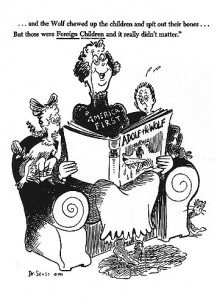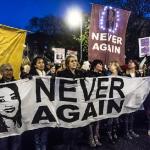“Killing Osama bin Laden Is Legal,” Matthew Yglesias notes:
… What went down is fine in both international and domestic law. … The use of military force is plainly authorized by U.N. Security Council Resolution 1368 … and this has all been reaffirmed since bin Laden’s death by the Security Council and the secretary-general of the United Nations.
The raid on bin Laden’s compound in Abbottabad was carried out unilaterally, but it occurred with the full consent and sanction of international law and multilateral institutions. “I am very much relieved by the news that justice has been done,” U.N. Secretary-General Ban Ki-moon said. It is simply not the case, as the great British theologian N.T. Wright regrettably asserts, that this was a lawless act of cowboy vigilanteism. The raid was legal. It had the sanction of international law and was conducted in accord with that law.
This operation was also conducted, to the extent that we can tell from the account emerging from various reports, with a commendable and largely successful effort to abide by the ethics of law as described by those “just war” principles we’re always discussing here — the same principles President Barack Obama discussed in his lecture on Reinhold Niebuhr in Oslo (on the occasion of being given the Nobel Peace Prize).
That Niebuhrian approach was reflected again in the president’s remarks announcing the successful completion of the raid on bin Laden, “justice has been done.” Justice, Niebuhr said, is the concern of “immoral society.” It is a lesser thing than the law of love or the law of Christ that constitutes the ideal for the moral individual:
From the perspective of society the highest moral ideal is justice. From the perspective of the individual the highest ideal is unselfishness. Society must strive for justice even if it is forced to use means, such as self-assertion, resistance, coercion and perhaps resentment, which cannot gain the moral sanction of the most sensitive moral spirit. …
And also:
The weaknesses of the spirit of love in solving larger and more complex problems become increasingly apparent as one proceeds from ordinary relations between individuals to the life of social groups. If nations and other social groups find it difficult to approximate the principles of justice, as we have previously noted, they are naturally even less capable of achieving the principle of love, which demands more than justice. The demand of religious moralists that nations subject themselves to “the law of Christ” is an unrealistic demand, and the hope that they will do so is a sentimental one. …
What Niebuhr means there in Moral Man and Immoral Society by “larger and more complex problems” is the geometrical complications that arise when the cheek that is struck is not one’s own.
Another British bishop, Rowan Williams, exhibited the appropriately “sensitive moral spirit” Niebuhr describes when he said following the death of bin Laden, “I think that the killing of an unarmed man is always going to leave a very uncomfortable feeling because it doesn’t look as if justice is seen to be done in those circumstances.”
So where Wright accuses the U.S. of behaving like a character from an old Hollywood western, Williams complains that the soldiers conducting this raid did not behave more like Gary Cooper in High Noon, keeping their guns holstered until the bad guys draw theirs. But the pageantry of a duel is not what is ethically required of soldiers. Soldiers are forbidden — ethically and legally — from targeting noncombatants, but enemy combatants do not cease to be combatants when they are caught off guard, when their back is turned or when their weapon has been set down out of reach.
What the good bishops are struggling with, I think, was expressed in more temperate and thoughtful terms by Christof Heyns and Martin Scheinin, the UN special rapporteurs, respectively, on “extrajudicial, summary or arbitrary executions” and on “the promotion and protection of human rights and fundamental freedoms while countering terrorism.” In a joint statement following the raid that killed bin Laden, they requested assurances that the raid was, as the secretary-general had said, conducted in accordance with international law:
Acts of terrorism are the antithesis of human rights, in particular the right to life. In certain exceptional cases, use of deadly force may be permissible as a measure of last resort in accordance with international standards on the use of force, in order to protect life, including in operations against terrorists. However, the norm should be that terrorists be dealt with as criminals, through legal processes of arrest, trial and judicially decided punishment.
Actions taken by States in combating terrorism, especially in high profile cases, set precedents for the way in which the right to life will be treated in future instances.
In respect of the recent use of deadly force against Osama bin Laden, the United States of America should disclose the supporting facts to allow an assessment in terms of international human rights law standards. For instance it will be particularly important to know if the planning of the mission allowed an effort to capture Bin Laden.
It may well be that the questions that are being asked about the operation could be answered, but it is important to get this into the open.
That matter of whether “the mission allowed an effort to capture bin Laden” is of particular importance to clarify whether or not the accusations made by Williams, Wright and others have any merit. The U.S. response seems to be on two levels. At the most basic level, the answer is yes, the mission allowed for an effort to capture bin Laden. That seems to have been one factor in the decision to go with “the McRaven option” — the riskier, boots-on-the-ground approach devised by Navy Vice Adm. William H. McRaven. The Navy SEALs conducting the raid were instructed to capture bin Laden if he “conspicuously surrendered.”
But the raid was to be conducted by Navy SEALs, meaning that this was not primarily intended as the “legal process of arrest, trial and judicially decided punishment.” It was a military operation in which bin Laden was to be regarded as an enemy combatant rather than as a fugitive criminal. As such, the salient point for those who planned and conducted this raid was not whether or not bin Laden had drawn his six-shooter at the instant the SEALs confronted him, but rather the presence there of documents and hard-drives containing his plans for future attacks against civilians in the U.S. and elsewhere.
Now one can certainly argue, as many great saints have throughout the centuries, that there ought to be no such thing as soldiers. One can argue, in other words, for an absolute pacifism, for “the principle of love, which demands more than justice” and which forbids all coercion, violence and killing. I respect the coherence of that principled stance, even while agreeing with Niebuhr about the practicality of it and the injustices that arise from that impracticality. (It’s possible that Niebuhr and I are both wrong about that. But our just war position is also coherent and principled and, sadly, I think we’re right.)
But there is a difference between criticizing this action against bin Laden on the basis of absolute pacifism and attempting to apply that same critique while still allowing for the legitimacy and necessity of soldiers and the force they bring to bear. Once you accept that legitimacy and necessity, it is disingenuous to complain that soldiers behave like soldiers rather than like saints. If you accept that wars must sometimes be fought and that soldiers must sometimes kill, then the question becomes how to restrain the evil of war and how to ensure that soldiers are able to behave morally even in the crucible of conflict.
This is where the principles of the just war tradition become vitally important — both those principles governing whether or not war is justified and those governing its just conduct. The raid on bin Laden’s compound in Abbottabad, I believe, was planned and conducted with a serious effort to comply with both of those sets of principles.
I admire and respect N.T. Wright greatly. I am deeply grateful to him for several books that have enriched my thinking, my faith and my life. But his argument that this raid was unjustifiable is simply wrong. The series of analogies he presents do not correspond to the facts of the matter. They would only be relevant if we completely disregarded the existence and importance of those U.N. resolutions and authorizations that Matt Yglesias points toward. That’s an odd thing to disregard in the midst of what amounts to an argument for such resolutions and authorizations. “By what right?” Wright asks, but then unfortunately doesn’t seem interested in listening to the answer.
Bob Woodward’s account of the planning of the raid illustrates that it was both planned and conducted with serious regard for military ethics and an effort to comply with the rules of just conduct:
A “pattern of life” study of the compound by intelligence agencies showed that about a dozen women and children periodically frequented it.
Specific orders were issued to the SEALs not to shoot the women or children unless they were clearly threatening or had weapons. (During the mission, one woman was killed and a wife of bin Laden was shot in the leg.) Bin Laden was to be captured, one official said, if he “conspicuously surrendered.”
The presence of noncombatant women and children in the compound required a riskier and more dangerous operation than less discriminate approaches, such as destroying the entire compound with bombs or missiles. That’s a general rule: The greater the pains taken to ensure the safety of noncombatants, the greater the risk and danger assumed by the soldiers taking such pains. The Navy SEALs know this. It’s their job to know this. They seem to have accepted such greater risk when dealing with the women and children in the compound, but not with the men who apparently were to be slain quickly unless they “conspicuously” surrendered.
Yes, that’s killing the enemy. And yes, Jesus said we must love our enemies. But again, love demands more than justice, and mere justice is what concerns us when considering the principles of just war for our immoral society. Based on Woodward’s account and others like it, the planners of this raid and the SEALs who carried it out seem to have abided by those principles admirably.
The special rapporteurs are correct that apart from “exceptional cases … the norm should be that terrorists be dealt with as criminals, through legal processes of arrest, trial and judicially decided punishment.” I don’t think it’s difficult to argue that Osama bin Laden constituted an exceptional case, but I also share their concern that such exceptional cases not “set precedents” that would supplant the norm of legal processes in most cases.
That concern is, I think, valid. But the concern that this action was illegal — or the accusation that it was obviously illegitimate — cannot be squared with the facts of the matter. As Matt Yglesias put it, “There’s just nothing there” to support that accusation.
















